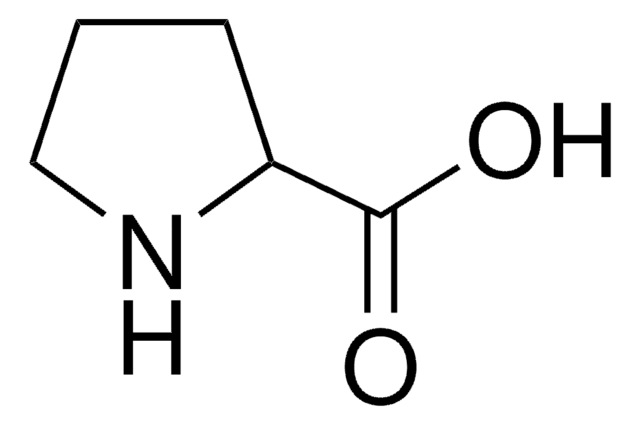81709
L-Proline
≥99.5% (NT), suitable for cell culture, BioUltra
Synonym(s):
(S)-Pyrrolidine-2-carboxylic acid
About This Item
Recommended Products
product name
L-Proline, BioUltra, ≥99.5% (NT)
product line
BioUltra
Quality Level
Assay
≥99.5% (NT)
form
powder or crystals
optical activity
[α]20/D −85.0±1.0°, c = 5% in H2O
technique(s)
cell culture | mammalian: suitable
impurities
insoluble matter, passes filter test
≤0.3% foreign amino acids
ign. residue
≤0.1%
loss
≤0.1% loss on drying, 20 °C (HV)
color
colorless to white
pH
6.0-7.0 (25 °C, 1 M in H2O)
mp
228 °C (dec.) (lit.)
solubility
H2O: 1 M at 20 °C, clear, colorless
anion traces
chloride (Cl-): ≤100 mg/kg
sulfate (SO42-): ≤100 mg/kg
cation traces
Al: ≤5 mg/kg
As: ≤0.1 mg/kg
Ba: ≤5 mg/kg
Bi: ≤5 mg/kg
Ca: ≤10 mg/kg
Cd: ≤5 mg/kg
Co: ≤5 mg/kg
Cr: ≤5 mg/kg
Cu: ≤5 mg/kg
Fe: ≤5 mg/kg
K: ≤50 mg/kg
Li: ≤5 mg/kg
Mg: ≤5 mg/kg
Mn: ≤5 mg/kg
Mo: ≤5 mg/kg
NH4+: ≤20 mg/kg
Na: ≤50 mg/kg
Ni: ≤5 mg/kg
Pb: ≤5 mg/kg
Sr: ≤5 mg/kg
Zn: ≤5 mg/kg
λ
1 M in H2O
UV absorption
λ: 260 nm Amax: 0.05
λ: 280 nm Amax: 0.05
SMILES string
OC(=O)[C@@H]1CCCN1
InChI
1S/C5H9NO2/c7-5(8)4-2-1-3-6-4/h4,6H,1-3H2,(H,7,8)/t4-/m0/s1
InChI key
ONIBWKKTOPOVIA-BYPYZUCNSA-N
Looking for similar products? Visit Product Comparison Guide
Application
- Synthesis and in silico inhibitory action studies of azo-anchored imidazo[4,5-b]indole scaffolds against the COVID-19 main protease (M(pro)).: This publication discusses the synthesis of novel compounds using L-Proline and their potential as inhibitors against COVID-19, contributing to the ongoing search for effective treatments (Geedkar et al., 2024).
Other Notes
Storage Class Code
13 - Non Combustible Solids
WGK
WGK 1
Flash Point(F)
Not applicable
Flash Point(C)
Not applicable
Personal Protective Equipment
Certificates of Analysis (COA)
Search for Certificates of Analysis (COA) by entering the products Lot/Batch Number. Lot and Batch Numbers can be found on a product’s label following the words ‘Lot’ or ‘Batch’.
Already Own This Product?
Find documentation for the products that you have recently purchased in the Document Library.
Customers Also Viewed
Articles
Proline analogues are promising candidates for tuning the biological, pharmaceutical, or physicochemical properties of naturally occuring, as well as de novo designed, linear, and, cyclic peptides.
Proline analogues are promising candidates for tuning the biological, pharmaceutical, or physicochemical properties of naturally occuring, as well as de novo designed, linear, and, cyclic peptides.
Proline analogues are promising candidates for tuning the biological, pharmaceutical, or physicochemical properties of naturally occuring, as well as de novo designed, linear, and, cyclic peptides.
Proline analogues are promising candidates for tuning the biological, pharmaceutical, or physicochemical properties of naturally occuring, as well as de novo designed, linear, and, cyclic peptides.
Our team of scientists has experience in all areas of research including Life Science, Material Science, Chemical Synthesis, Chromatography, Analytical and many others.
Contact Technical Service






